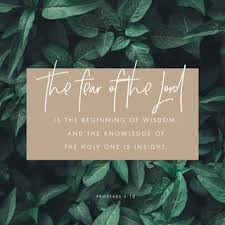Fear me!
In last week’s WordBytes, Mike Glenn, in The Fear of God, shared how his father helped him understand the “true meaning” of fear.
Now, son. You’re getting into a new phase of your life. You’re becoming a man. You’ll be going places where I won’t be. You’ll be doing things I won’t see. You’ll be pressured by your friends to do some things, and some of those things, you know, are things I don’t want you to do.”
“And in that moment, you’ll have to make a decision. You’ll have to decide. Are you more afraid of your friends? Or are you more afraid of me?”
Then he leaned across the table, put his eyes directly on mine and said, “You’d better be more afraid of me.”
This exchange was not only a lesson about fear, but also an object lesson on knowledge. Mike Glenn knew his father’s expectations. These expectations coupled with fear guided Mike Glenn in making good decisions and wise choices. The same can be said about our fear of the LORD and our knowledge of the Holy One.
That is why Solomon penned, “The fear of the LORD is the beginning of wisdom, and the knowledge of the Holy One is understanding.” (Prov. 9:10)
Fear-> Wisdom->Knowledge
Man has always searched for the best method to assist him in making good decisions, right judgments, and sound pronouncements. In primitive times, groups would cast lots and dice, leaving the outcome to the proverbial “fates” (Lev. 16:8; Joshua 18:8).
In Israel’s early formation, decisions were informed by the High Priest who consulted the Urim and Thummin (Exo. 28:30). As the nation grew, Israel deferred key moral and political decisions to God’s chosen representatives. Judges and kings, counseled by wise prophets and priests, became the source of national decision-making.
The fear of the Lord offered motivation to seek “God’s face” (Num. 6:25-26). However, it was the knowledge of the Holy One that established the critical link to God. God was (and still is) the source of all knowledge and wisdom.
Knowledge of the Holy One
The true source of wisdom is identified in the parallel statements found in Proverbs 9:10: the fear of the LORD and knowledge of the Holy One. Knowledge provides insight and discernment based on personal experiences.
It involves the process by which one can recognize, classify, and organize information gained from varied experiences and use them to develop an appropriate response. This “process of knowing” is illustrated in the story of Moses.
Moses’ early knowledge of God came vicariously through others in Pharaoh’s court. He, personally, knew little about God. Therefore, God had no part in his thinking or planning. However, forty years later, Moses experienced God for himself at the burning bush (Exod. 3:2). In seeing that the fire did not consume the bush, Moses recognized God’s power and holiness. Moses’ response to knowing God was awe and reverence (Exod. 3:5).
After witnessing the ten (10) plagues against Pharaoh and Egypt, Moses’ knowledge was exponentially expanded. As Moses observed (classified) the different ways God dealt with Pharaoh’s resistance, he knew that God was more powerful than any god worshiped in Egypt.
Moses’ knowledge of God through his various experiences resulted in the organized deliverance of the Israelites from Egypt. Their collective response to God was worship and praise (Exodus 15: 1, 11). On the other hand, Pharaoh’s disregard of what he knew of God, led to the destruction of his army (Ex. 14:18). Pharaoh refused to factor in his knowledge of the Holy One.
The Revelation of God
Knowledge of the Holy One is the revelation of God (Ep. 1: 17-18). It shapes our reality so that we conform to the will of God and respond appropriately to the events of life. This knowledge is gained through our personal experiences with Him, through His revealed Word, and through the Holy Spirit.
What shapes our key decisions and choices? What knowledge do we turn to regarding our family, our profession, and our relationships? Are we like Moses or like Pharaoh?
Knowledge of the Holy One reminds us of three things: (1) whose we are (our relationship with God), (2) who we are (our identity in Christ), and (3) how we are to live (in obedience and service to God).
Fear of the Lord (respect, reverence, and obedience) will lead us to wisdom (a disciplined and holy life).
Knowledge of the Holy One (personal experience) will give us godly insight and discernment to navigate 21st century challenges.
When wisdom enters your heart,
and knowledge is pleasant to your soul;
Discretion will preserve you;
understanding will keep you.
(Prov. 2:10-11, NKJ)

